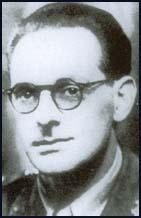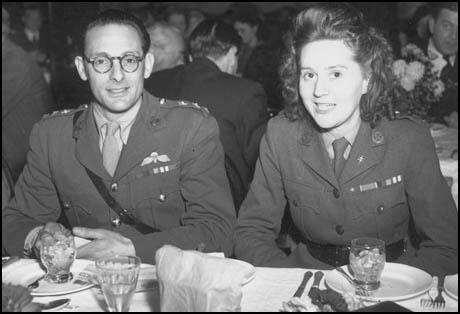Peter Churchill

Peter Churchill, the son of a consular officer, was born in Amsterdam on 14th January, 1909. He attended Cambridge University where he was an outstanding athlete and played for his country at hockey.
During the Second World War he became an intelligence officer and eventually joined the Special Operations Executive (SOE).
In January 1942 he was sent to occupied France where he supplied money to the Maquis and assessed the potential for helping the French Resistance. After returning to England he was promoted to captain.
Churchill returned to France in August 1942 where he helped Andre Girard establish the Spindle Network. Odette Sansom was recruited as the group's radio operator. The main object of this network was to help direct aerial delivery of arms and ammunition for the Maquis.
The Spindle Network was infiltrated by spies and on 16th April, 1943, Churchill and Sansom were arrested by Hugo Bleicher of Abwehr. They claimed they were husband and wife and related to Winston Churchill. They hoped that this story would help them receive better treatment while in prison.
Both Churchill and Sansom were tortured by the Gestapo before being sent to concentration camps. However, they were not executed and they were both still alive when liberated by the Allies at the end of the war.

Peter Churchill and Odette Sansom were married in 1947 but divorced in 1955. Churchill wrote several books about his wartime experiences including Of Their Own Choice (1952), Duel of Wits (1953), The Spirit of the Cage (1954) and By Moonlight (1958).
Peter Churchill died on 1st May 1972.
Primary Sources
(1) In his book Specially Employed, Maurice Buckmaster, the head of Special Operations Executive, explained why he needed to send agents such as Peter Churchill to occupied France.
We quickly learned that the courage, endurance and pugnacity of the patriots living in occupied territory were in direct proportion to the brutality of the occupying force's repressive measures. No occupying power can break the spirit and blunt the retaliatory power of a patriotic and proud people. Conversely, no occupied country can take really effective action against an occupying power without aid from outside. Co-ordination of effort was essential, for uncoordinated sabotage contributes but little to the destruction of the occupying power's potential. It merely invites reprisals, which in turn provoke further retaliation by the patriots. But if the occupied people feels that it is being neglected or left in the lurch by its allies, if it begins to listen and, by the force of repetition, to accept as truth the enemy's view.
(2) Patrick Howarth worked for the Special Operations Executive during the Second World War and afterwards wrote about his experiences in the book, Undercover (1980)
Of the SOE agents who were captured in France and sent to concentration camps few survived. Perhaps the most famous of these who did was a French girl, Odette Brailly, who had married an Englishman named Sansom by whom she had three children. She was parachuted in to serve as courier to Peter Churchill, a Cambridge ice-hockey blue, who had been operating over an extensive area of southern France. Both were arrested. Odette Sansom succeeded in convincing her interrogators that it was she and not Churchill who made the decisions and, as the citation for the George Cross which she was awarded stated, that it was she and not Churchill who should be shot. In fact they both survived, not least because of the skill with which Odette Sansom caused her interrogators to believe that Peter Churchill was related to Winston Churchill and that she was Peter Churchill's wife. They were indeed to be married later.
(3) Jimmy James, Moonless Night (2001)
Peter Churchill and Johnny Dodge roomed together in the first barrack hut I had passed on my arrival. Wings and I joined them for meals and formed the British Officers' Mess, Sonderlager A. We were looked after by two splendid Italian soldiers who had been orderlies to the Italian Naval, Military and Air Attaches who had been removed from the compound following the Italian surrender; Bartoli, formerly a pastry cook in Rome, performed daily miracles with German rations and the limited Red Cross parcels, with Amici, a cousin of the Hollywood actor Don Amici.
Like all old prisoners we had become indifferent to surroundings or personal comfort and, in a new milieu, were mainly interested in those with whom we should have to continue our indeterminate and apparently endless incarceration. Listening to one another's accounts of his journey to this point in time we felt, for a space, timeless, and forgot our narrow confines - the high sullen walls restricting our vision to the tops of the pine trees, and the lowering faces of the SS guards patrolling, dog at heel, between the wall and the electrified fence.
Wings' renegade officer plan with Tobolski as German escort had gone awry. Their Berlin contact had failed and they had travelled on to Stettin by train. They had the address of a brothel which had been used as a stopping point on an escape route, but they found it dark and empty; they could not know that all brothels had been closed in 1943 and prostitution made illegal. Tobolski had a sister in Stettin married to a German, but she had begged him to try to get help elsewhere when he approached her. They had, therefore, tried prostitutes before family, but now they went to the tool shed at the bottom of the garden behind the sister's house, which she said could be used as a one night shelter if they insisted. They found eggs, bread and milk left out for them. The next day they managed to infiltrate themselves into a dockside barrack housing a working party of French prisoners of war who agreed to help them board a neutral ship for Sweden. However, they were betrayed by an informer and arrested by the German police the next morning.
I'd like to wring his bloody neck,' Wings had told the police officer who was interrogating him. `Don't worry,' the policeman replied. `Of course this little lot will be worth about a thousand Reichsmarks to him, but when he is of no further use to us we shall see that his activities are made known to his comrades. Then, no doubt, his body will be found floating in the harbour.'
Wings was separated from Tobolski at Gestapo Headquartcrs in Berlin. He was told by General Nebel, Head of the Kripo, that he had become a serious nuisance and was to be sent to a place from which there was no escape. Tobolski was shot.
All things are relative. To Captain Peter Churchill, after eight months in Fresnes Prison in Paris under threat of torture and death, the Sonderlager seemed like a reprieve. A degree in modern languages at Cambridge followed by years of residence in France had made him a natural selection for SOE (Special Operations ' Executive) who had been exhorted by Winston Churchill to `set Europe ablaze'. Arriving by parachute, Lysander and submarine, returning by steep Pyrenean paths, he had been caught on his fourth mission with his courier Odette at Annecy.
The name of Churchill and his claim to kinship with the great man had saved Peter from torture and probable execution. Their pose as a married couple had saved Odette from execution but not from torture; courageously claiming to be the head of the south-east network of agents, she had taken the heat off Peter and brought upon herself the searing pain of a red hot iron on her back, the extraction of all her toe nails, and incarceration in the Concentration Camp at Ravensbruck.
(4) Odette Sansom was kept in Ravensbruck Concentration Camp. She was interviewed about these experiences by Rita Kramer for her book Flames in the Field (2010)
The others thought they had been captured because of the work they were doing or the people who they were with. And I did too. Everybody tried to be a little braver than they felt. All of us had a moment of weakness, we did all cry together at one moment, there were a few tears, but after all it was a lovely spring day in Paris. Riding in the van from the Avenue Foch to the station we could get a glimpse of what was going on in Paris, people sitting on the terraces of cafes drinking their ersatz coffee or whatever.
On the train we were handcuffed, each one of us handcuffed to somebody else, so we were not free to move around or anything, but we did not look absolutely miserable. No, we made the best of it. I remember one of them even asked a guard for a cigarette, and he gave her one.
We were frightened deep down, all of us. We were wondering what was the next thing, a normal thing to ask yourself in those circumstances. Were we going straight to our death, were we going to a camp, were we going to a prison, were we going to - what? We couldn't not think of those things. Our only hope was maybe to be together somewhere.
(5) Odette Hallowes, The Times (17th March, 1975)
Of all the women who took part in special operations in France, Odette - as she was universally known in spite of having borne three married surnames in her lifetime - perhaps best symbolized the indomitable spirit of resistance to Nazism. Captured by the Gestapo in France and consigned after being cruelly tortured in Paris's notorious Fresnes prison, to Ravensbrück concentration camp, she emerged emaciated, weak and gravely ill at the end of the war. But in the years that followed, her undiminished mental and moral energy, combined with a complete absence of bitterness towards her tormentors and the nation that had spawned them, became a beacon to others who had suffered disfigurement, pain or bereavement. Indeed the theme of her postwar working life, with its service to various charities and help for the underprivileged, was the healing of those wounds, both physical and mental, which had been inflicted upon individuals by the war. Her George Cross, she always maintained, was not to be regarded as an award to her personally, but as an acknowledgment of all those known and unknown, alive or dead, who had served the cause of the liberation of France. Her wartime experiences had taught her two great truths; that suffering is an ineluctable part of the human lot, and that the battle against evil is never over. Fame came to her - notably, through the film Odette which celebrated her life - but she never sought it.

